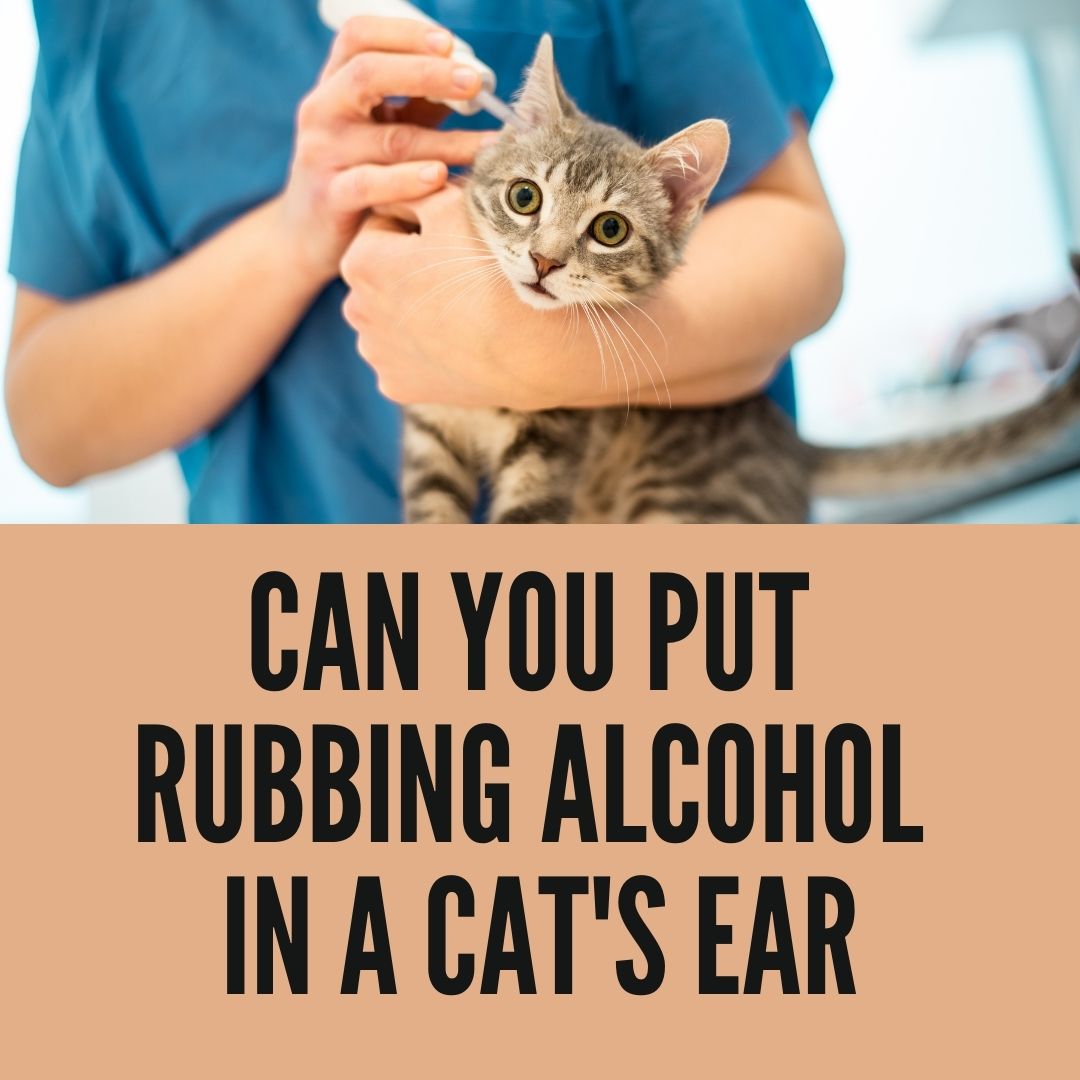
Ear cleaning is necessary for pets. You cannot go overboard in cleaning your pet’s ear but doing it when required is quite essential.
However, because ears have a sensitive internal canal, it is necessary to use a cleaner meant to go inside.
A lot of dog and cat owners recently came up with a query stating, “Can I clean my pet’s ear with Rubbing Alcohol“? While many internet platforms suggest using Alcohol and Peroxide in cats’ and dogs’ ears, a pet owner must go by the doctor’s suggestion only.
And here is all about what doctors and experts suggest about using Rubbing Alcohol on pet’s ears. Have a look:
Is it safe to clean pets’ ears by Rubbing Alcohol?
Even though several individuals might suggest you use Rubbing Alcohol in your pet’s ear, still DON’T.
Rubbing Alcohol is a harsh chemical solvent and is not meant for any kind of internal usage.
Any such solvent inside the cat and dog’s ear can cause severe irritation and can even lead to damage.
Instead, always go for pet ear cleaners suggested by a veterinary clinic or the ones available at pet stores.
Is Alcohol bad for cat’s ears? Why?
Rubbing Alcohol isn’t safe at all for using inside a cat’s ears. While you flush the cat’s ear canal with Rubbing Alcohol, the solvent displaces water and makes the canal skin dry. It might also lead to severe pain or eardrum perforation in extreme cases.
How can I treat my cat’s ear infection at home?
Is your cat starching her ear like crazy? It is may because of an ear infection inside.
Ear infections are uncommon in cats, but they aren’t impossible. While outdoor cats are more prone to such infections, your indoor ones, too, might catch some. And if it happens, the poor little kitty must be going through a lot of pain and discomfort.
If you notice your cat scratching her ear or juggling with some discomfort, immediately check. Under sunlight or using a torch, check your cat’s ear nicely.
If there lies an infection, you may notice dry, flaky skin, red skin, or maybe some liquid discharge. There might stay some odd smell as well. If yes, then do not avoid it.
Meet the Veterinarian immediately whenever you notice your cat has an ear infection. While ignoring the issue might worsen it, treating it at home won’t do much good.
A Veterinarian will closely examine your cat’s ear and find out the cause of the infection. It can be a bacterial infection, yeast infection, or mites.
Depending on the cause and severity, the Veterinarian will suggest both oral and topical medications.
What can I use to clean my dog’s ears at home?
Cleaning a dog’s ear is part of their grooming. You don’t need to do it every day, but there is a necessity to ensure dryness and cleanliness inside their ears.
The cleaning frequency (for the dog’s ear) depends upon several factors. Some breeds are prone to allergies and infection and hence, cleaning their ears is essential.
Or, if your canine buddy goes swimming or plays in the mud, you need to watch what goes inside their ears and nose. Though over, cleaning too isn’t advised as it can lead to irritation and even infection.
Here is how to can gently and safely clean your dog’s ears at home:
Things you may need:
- A pack of pet-safe cotton balls or rounds.
- The Veterinarian recommended an ear solution.
The Process:
- Firstly, lift your dog’s ear flap gently and put some ear solution inside the ear canal.
Or
- For dogs who make it challenging to put ear solution, take a cotton round, dip it into the solution and apply it on the canal. Do not go very deep.
- Now massage your dog’s ear canal gently for half to one minute, ensuring the ear solution spreads nicely. If your dog shakes his head, let it be, that is entirely ok.
- Lastly, use a dry cotton ball/ round and wipe away all the ear solution, debris and dirt. Stay till the upper canal only.
How do you flush out a dog’s ears?
Flushing out a dog’s ear is as same as cleaning. You can use a saline solution and put it inside your dog’s ear canal.
Gently massage the lower canal, and then after a minute or two, using a cotton ball, clean all the dirt and wax.
Or, if your dog makes the cleaning process difficult, you can always take him to dog grooming places. These professionals also pay a home visit if someone cannot step out.
How to make homemade dog ear cleaner?
Here are a few of the best dog ear cleaning solutions (Homemade Recommendations)
Many things in your skin and hair care vanity may help clean a dog’s ears.
For example,
- Glycerine makes up for a convenient dog ear cleaner. It is mild, does not irritate, and keeps ear canal skin moisturized.
- Olive oil is another safe-to-use product from your vanity that is ideal for cleaning a dog’s ear. Even if it accidentally spreads on your dog’s coat, it will only provide it with richness. However, because using oil can be a little messy, always use a dropper.
What essential oils can I use to clean my dog’s ears?
Some of the essential oils that are safe for use inside a dog’s ears include
Colloidal silver, frankincense essential oil, lavender oil, copaiba essential oil, tea tree oil, etc.
Though before using them, always consult with the vet first.
How to clean a dog’s ears with vinegar and Alcohol?
Many pet owners clean dog ears with vinegar and Alcohol, but we do not suggest the same.
Both vinegar and Alcohol are chemically harsh and will cause irritation/ pain in the dog’s ear. And if your dog has an ear infection, both of these liquids can worsen it even more.
How to clean dog ears with hydrogen peroxide?
Several pet owners swear by Hydrogen Peroxide when cleaning dogs’ ears.
However, unless your veterinarian suggests/approves of the same, do not use Hydrogen Peroxide in your dog’s ear.
Researchers suggest that solvents like Peroxide and Rubbing Alcohol can irritate healthy skin cells.
And because the tissue inside the ear is extra sensitive, prolonged exposure to Peroxide may damage ear and hearing capabilities both.
Homemade dog ear cleaner vs. Vet recommended dog ear cleaner
When choosing between homemade dog ear cleaner and vet-recommended dog ear cleaner, always go with the latter.
There is a wide range of dog and pet ear cleaners available in the market. You may get them at the pet store, online, or even at your nearest departmental store.
Some of the typical dog ear cleaner that even vet recommends include,
MalAcetic Otic, Douxo Micellar, Otoclean, Cerumene, TrizUltra+Keto, Zymox Ear Cleanser
CAUTION: Do not use any of them without a doctor’s recommendation.
What can I use to clean my cat’s ears at home?
Cats aren’t prone to dirty ears, but they might need some ear cleaning. Mainly to ensure good ear health, regular clinic and monitoring are necessary.
If you regularly remove dirt and debris from your cat’s ear, no infection or irritation will trouble them.
Here is how you can clean your cat’s ear at home:
Things you may need:
- A pack of pet-safe cotton balls or rounds.
- The Veterinarian recommended an ear solution.
- Olive Oil
- Lukewarm water.
The Process:
Note: Before cleaning your cat’s ear, consider removing any matter or detangled fur from that region. As if this fur enters inside your cat’s ear canal, it might block the way and lead to infection.
- Firstly, warm Olive oil or ear solution to room temperature. You can do that by Rubbing the bottle in between your palms. Or place the bottle over a bowl of lukewarm water.
- Now make your cat lay down on your lap with one ear facing upward.
- Now put some drops of either Olive oil or ear cleaning solution into the cat’s ear canal. If she makes the process complicated, then soak a cotton ball and apply the solution inside the upper canal.
- Further massage the base of the ear for a minute or half, ensuring all the liquid spreads nicely; if you have dropped the oil/ solution directly into the cat’s ear, massage for some time more.
- Now repeat the same process with another ear as well. After that, let your cat relax for 5 to 10 minutes. If the canine goes here and there, let them.
- Later after 10 minutes, take a cotton round/ ball and clean the upper canal and flap of the cat’s ear. Be gentle, though remove all the dirt and debris.
Can you put Rubbing Alcohol in a cat’s ear?
Will Rubbing Alcohol kill ear mites in cats? Rubbing Alcohol may kill ear mites in a cat’s ear, but using this solvent is not recommended. Instead, use any vet-recommended cat ear cleaner or homemade cat ear cleaner (After consulting the vet) for the same.
Wrapping up…
This was all about cleaning and maintaining your dog’s ear health. However, many dog owners and internet experts might suggest you use Rubbing Alcohol or Peroxide in the dog’s ear, but you DON’T.
If you are familiar with the harsh chemical properties of Rubbing Alcohol and other such solvents, do not let your pet suffer from them. Instead, there are endless other ways by which you can keep their ear clean.
FAQ’S
The brown stuff inside your cat’s ear is nothing but the earwax. A little wax inside the ear is healthy as it keeps dirt and debris from entering deeper into the canal. However, excessive wax inside a cat’s ear might indicate allergy or infection. If you notice something like that, take your cat to the Veterinarian soon.
The black stuff in your cat’s ears might be ear mites. Or, if it is a black crusty build-up, it may be a dry discharge made up of blood, debris, and wax. You might need to reach professional pet groomers for help. They have special solutions and tools for removing all such stuff.
That Brown stuff inside your dog’s ear can be an overproduction of ear wax, mites, an ear infection, polyps, etc. It may be a sign of allergy or some infection as well.
If you happen to notice some brown stuff in your dog’s ear, consider consulting your vet. You may also use a dog ear cleaning solution, but a quick ear check-up is regarded as safe before that.
If you believe doctors and experts, then never use Hydrogen Peroxide on or inside your cat’s ear. Besides the ear part, Peroxide isn’t meant for any internal or medical usage on cats.

My name is Logan, and I’m a 36-year-old dad who owns a small pressure-washing company in the suburbs of Atlanta, Georgia. My main goal with rubbing-alcohol.com is to show you how versatile isopropyl rubbing alcohol can be! I hope. You find it useful.
